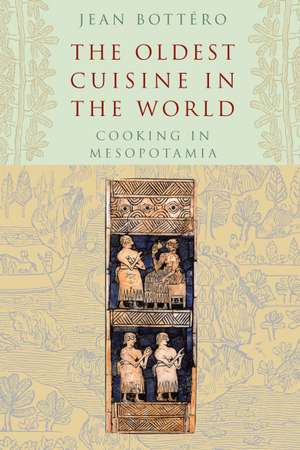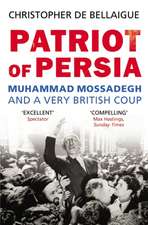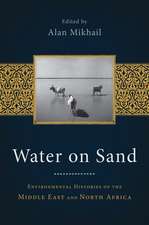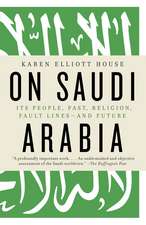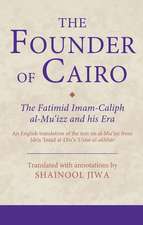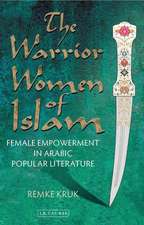The Oldest Cuisine in the World: Cooking in Mesopotamia
Autor Jean Bottéro Traducere de Teresa Lavender Faganen Limba Engleză Paperback – 30 apr 2011
Offering everything from translated recipes for pigeon and gazelle stews, the contents of medicinal teas and broths, and the origins of ingredients native to the region, this book reveals the cuisine of one of history’s most fascinating societies. Links to the modern world, along with incredible recreations of a rich, ancient culture through its cuisine, make Bottéro’s guide an entertaining and mesmerizing read.
| Toate formatele și edițiile | Preț | Express |
|---|---|---|
| Paperback (1) | 175.73 lei 3-5 săpt. | +8.71 lei 5-11 zile |
| University of Chicago Press – 30 apr 2011 | 175.73 lei 3-5 săpt. | +8.71 lei 5-11 zile |
| Hardback (1) | 420.64 lei 6-8 săpt. | |
| University of Chicago Press – 15 apr 2004 | 420.64 lei 6-8 săpt. |
Preț: 175.73 lei
Nou
Puncte Express: 264
Preț estimativ în valută:
33.63€ • 34.98$ • 27.76£
33.63€ • 34.98$ • 27.76£
Carte disponibilă
Livrare economică 24 martie-07 aprilie
Livrare express 08-14 martie pentru 18.70 lei
Preluare comenzi: 021 569.72.76
Specificații
ISBN-13: 9780226067346
ISBN-10: 0226067343
Pagini: 152
Ilustrații: 2 line drawings
Dimensiuni: 152 x 229 x 10 mm
Greutate: 0.23 kg
Editura: University of Chicago Press
Colecția University of Chicago Press
ISBN-10: 0226067343
Pagini: 152
Ilustrații: 2 line drawings
Dimensiuni: 152 x 229 x 10 mm
Greutate: 0.23 kg
Editura: University of Chicago Press
Colecția University of Chicago Press
Notă biografică
Jean Bottéro (1914–2007) was director emeritus of L'École Pratique des Hautes Études in Paris. He is the author of many books, several of which have been translated and published by the University of Chicago Press. Teresa Lavender Fagan has translated numerous books for the University of Chicago Press.
Cuprins
Acknowledgements
Translator's Note
Cooking and the Pleasures of the Table in Ancient Mesopotamia
The Framework, the Region, and the People
Sources
Food and Eating
Fire
Cooking
Hearths and Equipment
Indirect Cooking in Fatty Broth
Precooking
Food Preparation without Heat
Cooking with Heat
Cooks and Culinary Tradition
Drinks
Meals and Feasts
The Table of the Gods
The Table of the Dead
Food, Life, and Death
Conclusion
Notes
Abbreviations and Bibliography
Index
Translator's Note
Cooking and the Pleasures of the Table in Ancient Mesopotamia
The Framework, the Region, and the People
Sources
Food and Eating
Fire
Cooking
Hearths and Equipment
Indirect Cooking in Fatty Broth
Precooking
Food Preparation without Heat
Cooking with Heat
Cooks and Culinary Tradition
Drinks
Meals and Feasts
The Table of the Gods
The Table of the Dead
Food, Life, and Death
Conclusion
Notes
Abbreviations and Bibliography
Index
Recenzii
“[These recipes] shed light on aspects of social life related to food preparation and eating at the time. Here we are given intriguing, sometimes alluring quotes, on processes of preparation and what the Mesopotamians ate. Often the author has to patch and bridge from the fragmentary bits; what certain items and methods might have been, but he does this with the support of his considerable scholarship, and with a flare that suggests that M. Bottéro must be an accomplished cook himself. These rare recipes carefully reconstructed and sometimes deduced can seem surprisingly modern, yet this book is ever fascinating. . . . It makes one yearn to know more about these ancient sophisticates, as revealed in the swirling robes and haughty profiles of reliefs in the British Museum and in Berlin. Economically illustrated, with neat chapter headings, it is elegantly presented. The engaging chapters go from the practical to the mythical. Truly a wonderful read.”
“An enticing new book of Ancient Mesopotamian recipes.”
“In this well-structured volume, Bottéro shares the vast scope of his knowledge of ancient Mesopotamian cuisine. Although meticulously documented for the scholar and student, its lucid text also appeals directly to the adventurous home cook whether he/she wishes to recreate a meal of muddulu (salted meat) or a vegetarian <I>sipku<I> (porridge). If it is true that ‘we are what we eat’ then this book brings us closer to the human side of those who produced one of the first great civilizations to evolve on our planet.”
